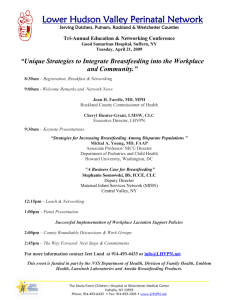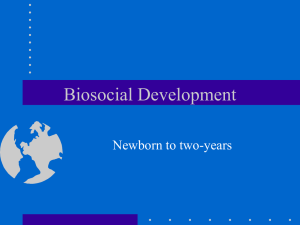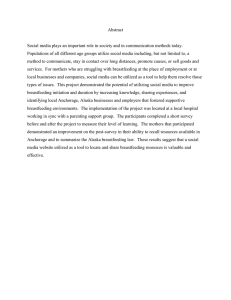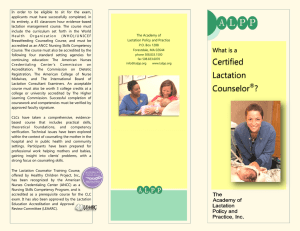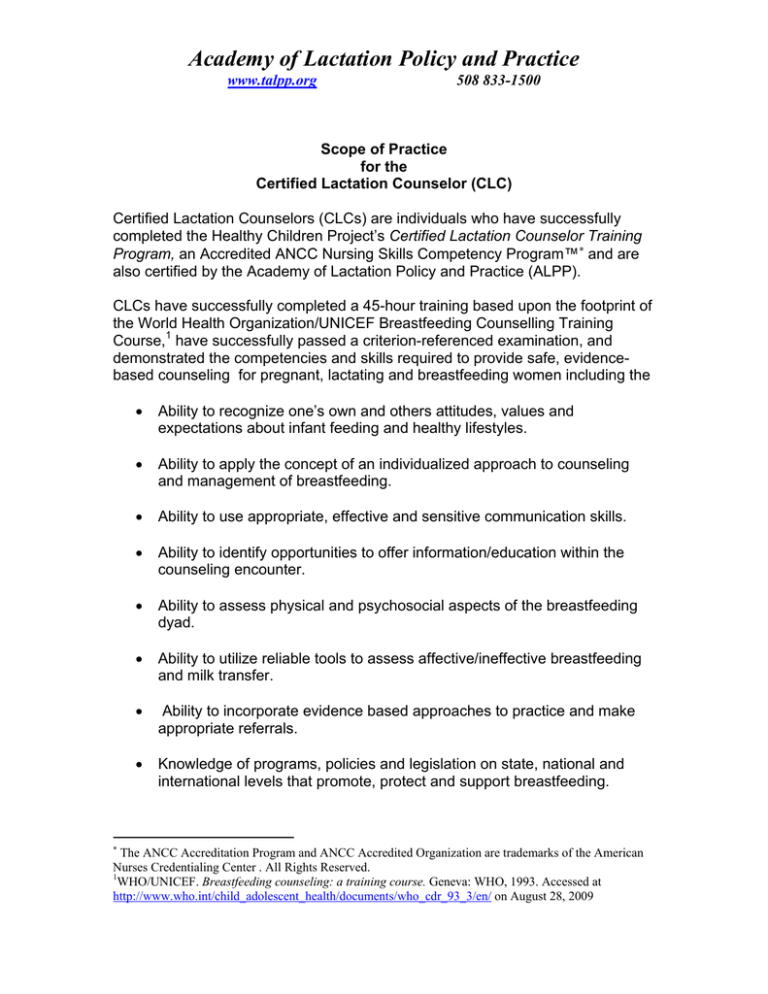
Academy of Lactation Policy and Practice
www.talpp.org
508 833-1500
Scope of Practice
for the
Certified Lactation Counselor (CLC)
Certified Lactation Counselors (CLCs) are individuals who have successfully
completed the Healthy Children Project’s Certified Lactation Counselor Training
Program, an Accredited ANCC Nursing Skills Competency Program™∗ and are
also certified by the Academy of Lactation Policy and Practice (ALPP).
CLCs have successfully completed a 45-hour training based upon the footprint of
the World Health Organization/UNICEF Breastfeeding Counselling Training
Course,1 have successfully passed a criterion-referenced examination, and
demonstrated the competencies and skills required to provide safe, evidencebased counseling for pregnant, lactating and breastfeeding women including the
∗
•
Ability to recognize one’s own and others attitudes, values and
expectations about infant feeding and healthy lifestyles.
•
Ability to apply the concept of an individualized approach to counseling
and management of breastfeeding.
•
Ability to use appropriate, effective and sensitive communication skills.
•
Ability to identify opportunities to offer information/education within the
counseling encounter.
•
Ability to assess physical and psychosocial aspects of the breastfeeding
dyad.
•
Ability to utilize reliable tools to assess affective/ineffective breastfeeding
and milk transfer.
•
Ability to incorporate evidence based approaches to practice and make
appropriate referrals.
•
Knowledge of programs, policies and legislation on state, national and
international levels that promote, protect and support breastfeeding.
The ANCC Accreditation Program and ANCC Accredited Organization are trademarks of the American
Nurses Credentialing Center . All Rights Reserved.
1
WHO/UNICEF. Breastfeeding counseling: a training course. Geneva: WHO, 1993. Accessed at
http://www.who.int/child_adolescent_health/documents/who_cdr_93_3/en/ on August 28, 2009
Academy of Lactation Policy and Practice
www.talpp.org
508 833-1500
According to the ANCC, the ANCC’s Nursing Skills Competency Program
addresses concerns regarding competency by validating that a skills program
meets national design standards. It offers a national performance benchmark for
selecting continuing education and skills training courses. Participants can
validate and claim continued proficiency in their specialized skills. ALPP
develops and administers the CLC examination to assess the knowledge and
skills that underlie competent practice in lactation counseling. The development,
administration and scoring of the CLC exam, after participants have met the skills
competency requirements, promotes competency in lactation management,
skills, and knowledge and thereby fulfills the mission of ALPP.
The purpose of the CLC certification is to protect the public by identifying
individuals who are competent in lactation management skills and knowledge.
This scope of practice addresses the foundation activities that CLCs have the
knowledge and skill to accomplish. Many individuals who hold the CLC credential
have other licensure and education, including nurses, peer counselors, doulas,
dietitians, nutritionists, physicians, midwives, occupational and speech therapy,
mental health counselors, etc. Because of the diverse background and training
of CLCs, this listing does not encompass activities that many CLCs may conduct
under the umbrella of other licensure, training, or knowledge.
Knowledge and Competency of the CLC
The credentialed CLC has demonstrated the knowledge and skill to:
• Construct and maintain conditions that predispose mothers and babies to
an uncomplicated breastfeeding experience through counseling, education
and support.
• Monitor and evaluate behavioral, cultural and social conditions
predisposing mothers and babies to an uncomplicated breastfeeding
experience.
• Assess for, monitor and evaluate physical conditions that predispose
mothers and babies to a complex breastfeeding experience.
• Monitor and evaluate behavioral, cultural and social conditions that
predispose mothers and babies to complex breastfeeding experiences.
• Identify and advocate for aspects of breastfeeding management programs
that facilitate optimal health outcomes.
• Assess breastfeeding using a multi-faceted approach.
• Use counseling skills and techniques that are supportive to breastfeeding
mothers and babies.
• Identify and advocate for public health strategies that serve to protect
breastfeeding.
• Coordinate care consistent with standards of professional ethics and
behavior.
Academy of Lactation Policy and Practice
www.talpp.org
508 833-1500
Thus, the ALPP CLC has demonstrated readiness to:
• Promote breastfeeding as the optimal method of infant feeding and care.
• Counsel and educate pregnant women and mothers regarding
breastfeeding.
• Conduct comprehensive assessment of mother and child related to
breastfeeding
• Develop a care plan specific to the needs identified through assessment
and counseling
• Assess the needs of women and babies who are at risk of, or currently
experiencing lactation difficulties, providing care and triaging referral to
other care providers as needed

